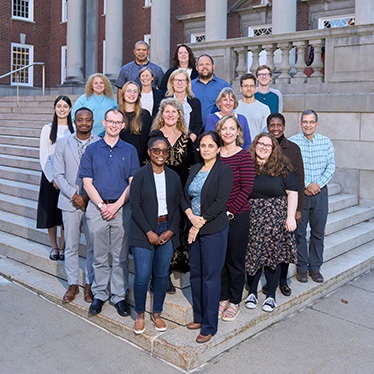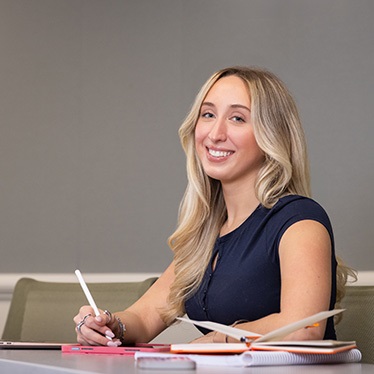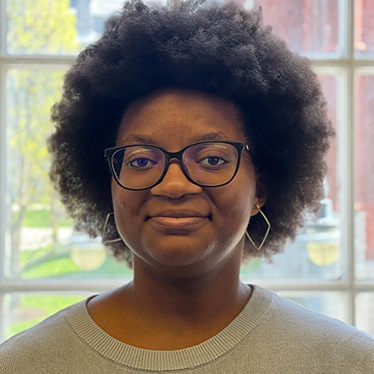A Bachelor’s in Maxwell
September 1, 2019
Related:
Citizenship & Civic Engagement, B.A.
This is a boom time for undergraduates at the Maxwell School—new majors, expanded research programs, diverse experiential opportunities, enhanced advising, and more. It all builds on a tradition of undergraduate education that goes back to Maxwell’s beginning. There has never not been a “Maxwell undergrad.”
During high school in Maplewood, New Jersey, Sofia Ratkevich volunteered with a local program for resettled refugee families, joining a group of teenagers from Syria and Iraq on activities and outings to help them get their bearings in their new community. The program appealed to Ratkevich’s keen interest in global issues and cultures, and also resonated with her because of her ancestry; over several generations, her mother’s family had migrated from Lebanon to Syria and ultimately the United States.
In researching colleges, Ratkevich found the Maxwell School’s international relations program to be a compelling choice for pursuing her interests, particularly in the Middle East. She was drawn to Maxwell, too, by its broader reputation as a school of public affairs, and by the types of engaged, ambitious students she met on visits to campus. “It sounds lofty,” Ratkevich says, “but I love to learn about the world as it is and be surrounded by people who are just as interested in what they are learning—and to be able to dive into deep discussions relating to different cultures and ways of viewing the world.”
So she picked Maxwell, and entered this fall with the rest of the Class of 2023. In doing so, she joined a tradition of undergraduate education extending back nearly a century. Since its founding, Maxwell has been the home of citizenship, public affairs, and social sciences programs at Syracuse University.
But Ratkevich and her colleagues were also part of a special cohort. They were the first students to apply directly to Maxwell—rather than applying, undeclared, to the College of Arts and Sciences. Plus, among them were 29 freshmen (including Ratkevich) admitted as Maxwell Leadership Scholars—a program offering standout students a generous annual scholarship, admission to the University Honors Program, and research funds, among other benefits.
For all the freshmen, their arrival on campus was preceded by a student-recruitment process, last winter and spring, that was more informative about what the promise of a Maxwell undergraduate education would be. Students such as Ratkevich were able to connect their public affairs aspirations to the School and its strengths. They then arrived on campus better focused on their educational goals, already prepared to participate in advising, and hosted by a school fully focused on their interests.
Because prospective students were better informed about the School, there were more and better matches made. Slightly more than 400 freshmen entered Maxwell this year (far beyond the target of 335). Their high school GPAs and SAT scores exceeded those of the previous class; the average SAT was, in fact, 14 points higher.
None of this was a great surprise, because the new admissions process shone a spotlight on an undergraduate legacy that has always been strong (if sometimes overshadowed by Maxwell’s celebrated graduate programs).
“The Maxwell School has always offered undergraduates a great educational experience,” says Carol Faulkner, Maxwell’s associate dean for academic affairs. “Direct admissions give us a chance to highlight all the exciting opportunities for students in our departments, programs, and centers, and with our partners.”
In a sense, then, this changes nothing. Though there are constant improvements, a Maxwell undergraduate education is as deep, innovative, applicable, and rewarding as ever. The professors and the facilities and the classes remain the same. Ratkevich and her freshman peers join all Maxwell undergraduates—now and through the years—for whom the heart of the Maxwell experience is its signature mix of teaching and research across the social sciences and public affairs, with an overarching interest in democratic citizenship.
Maxwell’s offerings for undergraduates are wide and deep and continue to expand, as detailed in the following pages. Recently introduced majors on citizenship and environmental policy build on the School’s legacy of interdisciplinary education. Numerous programs offer opportunities for hands-on independent research, as well as experiential learning through internships in the Syracuse community, in Albany and Washington, and abroad. And to help students navigate all these options, Maxwell and the College of Arts and Sciences have greatly enhanced academic and professional advising.
With all the growth in programming, and the arrival of the first class of Maxwell freshmen, there has perhaps never been a better time to be an undergraduate at Maxwell. As Faulkner puts it, “I’m excited to see all the new energy from students and faculty, who together will reshape what it means to be a Maxwell student and citizen.”
By Jeffrey Pepper Rodgers
This article appeared in the fall 2019 print edition of Maxwell Perspective © Maxwell School of Syracuse University.
Related News
School News

Jan 7, 2026
School News

Dec 5, 2025
School News

Dec 4, 2025
